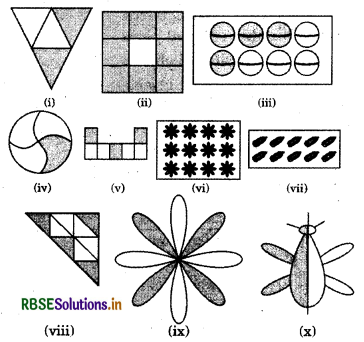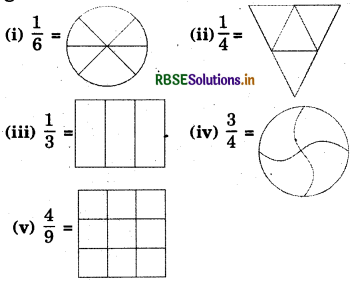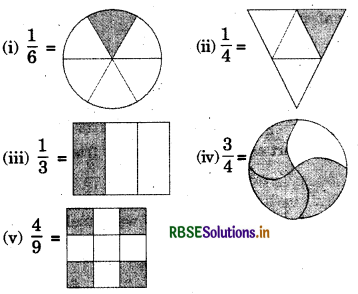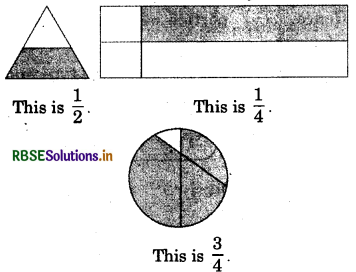RBSE Solutions for Class 6 Maths Chapter 7 Fractions Ex 7.1
Rajasthan Board RBSE Solutions for Class 6 Maths Chapter 7 Fractions Ex 7.1 Textbook Exercise Questions and Answers.
Rajasthan Board RBSE Solutions for Class 6 Maths in Hindi Medium & English Medium are part of RBSE Solutions for Class 6. Students can also read RBSE Class 6 Maths Important Questions for exam preparation. Students can also go through RBSE Class 6 Maths Notes to understand and remember the concepts easily. Students are advised to practice अनुपात और समानुपात के प्रश्न class 6 of the textbook questions.
RBSE Class 6 Maths Solutions Chapter 7 Fractions Ex 7.1
Question 1.
Write the fraction representing the shaded portion:

Answer:
(i) Number of equal parts = 4
Shaded parts = 2
∴ Fraction of shaded portion = \(\frac{\text { Shaded parts }}{\text { Total parts }}=\frac{2}{4}\)
(ii) Number of equal parts = 9
Shaded parts = 8
∴ Fraction of shaded portion = \(\frac{\text { Shaded parts }}{\text { Total parts }}=\frac{8}{9}\)
(iii) Number of equal parts = 8
Shaded parts = 4
∴ Fraction of shaded portion = \(\frac{\text { Shaded parts }}{\text { Total parts }}=\frac{4}{8}\)
(iv) Number of equal parts = 4
Shaded part = 1
∴ Fraction of shaded portion = \(\frac{\text { Shaded parts }}{\text { Total parts }}=\frac{1}{4}\)
(v) Number of equal parts =7
Shaded parts = 3
∴ Fraction of shaded portion = \(\frac{\text { Shaded parts }}{\text { Total parts }}=\frac{3}{7}\)
(vi) Number of equal parts = 12
Shaded parts = 3
∴ Fraction of shaded portion = \(\frac{\text { Shaded parts }}{\text { Total parts }}=\frac{3}{12}\)
(vii) Number of equal parts = 10
Number of shaded objects = 10
∴ Fraction of shaded portion = \(\frac{\text { Shaded parts }}{\text { Total parts }}=\frac{10}{10}\)
(viii) Number of equal parts = 9
Shaded parts = 4
∴ Fraction of shaded portion = \(\frac{\text { Shaded parts }}{\text { Total parts }}=\frac{4}{9}\)
(ix) Number of equal parts = 8
Shaded parts = 4
∴ Fraction of shaded portion = \(\frac{\text { Shaded parts }}{\text { Total parts }}=\frac{4}{8}\)
(x) Number of equal parts =2
Shaded part = 1
∴ Fraction of shaded portion = \(\frac{\text { Shaded parts }}{\text { Total parts }}=\frac{1}{2}\)

Question 2.
Colour the part according to the given fraction:

Answer:

Question 3.
Identify the error, if any :

Answer:
As for finding the fraction, the given figures should be divided into equal parts.
In the given diagrams, none of them are equally divided. So we can say that, none of the above diagram represents fractions.
Question 4.
What fraction of a day is 8 hours?
Answer:
Number of hours in a day = 24 hours
Given hours = 8
∴ Required fraction = \(\frac{\text { Given hours }}{\text { Total hours in a day }}=\frac{8}{24}\)
Question 5.
What fraction of an hour is 40 minutes?
Answer:
Number of minute in an hour
= 60 minute
Given minutes = 40 minute
∴ Required fraction = \(\frac{\text { Given minutes }}{\text { Total number of minutes in an hour }}\)
= \(\frac{40}{60}\)

Question 6.
Arya, Abhimanyu and Vivek shared lunch. Arya has brought two sandwiches; one made of vegetable and one of jam. The other two boys forgot to bring their lunch. Arya agreed to share his sandwiches so that each person will have an equal share of each sandwich.
(a) How can Arya divide his sandwiches so that each person has an equal share?
Answer:
Since there are total three people; Arya, Abhimanyu and Vivek who will eat the sandwiches.
Arya will divide the sandwiches into 3 equal parts.
(b) What part of a sandwich will each boy receive?
Answer:
Each boy will get \(\frac{1}{3}\) parts.
Question 7.
Kanchan dyes dresses. She had to dye 30 dresses. She has so far finished 20 dresses. What fraction of dresses has she finished?
Answer:
Total number of dresses = 30
Number of dresses finished = 20
∴ Fraction of finished dresses = \(\frac{20}{30}=\frac{2}{3}\)
Question 8.
Write the natural numbers from 2 to 12. What fraction of them are prime numbers?
Answer:
Total natural numbers from 2 to 12 = 11 {2, 3, 4, 5, 6, 7, 8, 9, 10, 11, 12}
Total prime numbers from 2 to 12 = 5 (2, 3, 5, 7, 11}
∴ Required fraction = \(\frac{\text { Total prime numbers }}{\text { Total natural numbers }}=\frac{5}{11}\)
Question 9.
Write the natural numbers from 102 to 113. What fraction of them are prime numbers?
Answer:
Total natural numbers from 102 to 113 = 12 (102, 103, 104, 105,106,107, 108, 109, 110, 111, 112,113).
Total prime numbers from 102 to 113 = 4(103,107,109,113)
∴ Required fraction = \(\frac{\text { Total prime numbers }}{\text { Total natural numbers }}=\frac{4}{12}\)
Question 10.
What fraction of these circles have X's in them?

Answer:
Total number of circles = 8
Number of circles having X = 4
∴ Required fraction = \(\frac{4}{8}\)

Question 11.
Kristin received a CD player for her birthday. She bought 3 CDs and received 5 others as gifts. What fraction of her total CDs did she buy and what fraction did she receive as gifts?
Answer:
Number of CDs bought by Kristin *= 3
Number of CDs received as gifts = 5
∴ Total number of CDs = 3 + 5 = 8
Fraction of CDs purchased
= \(\frac{\text { Number of CDs purchased }}{\text { Total number of CDs }}=\frac{3}{8}\)
Fraction of CDs received as gifts
= \(\frac{\text { Number of CDs received as gifts }}{\text { Total number of CDs }}=\frac{5}{8}\)

- RBSE Solutions for Class 6 Maths Chapter 2 Whole Numbers InText Questions
- RBSE Class 6 Maths Important Questions Chapter 1 अपनी संख्याओं की जानकारी
- RBSE Solutions for Class 6 Maths Chapter 7 भिन्न Intext Questions
- RBSE Solutions for Class 6 Maths Chapter 7 Fractions Ex 7.4
- RBSE Solutions for Class 6 Maths Chapter 1 Knowing our Numbers Ex 1.1
- RBSE Solutions for Class 6 Maths Chapter 1 Knowing our Numbers InText Questions
- RBSE Solutions for Class 6 Maths in Hindi Medium & English Medium
- RBSE Solutions for Class 6 Maths Chapter 7 Fractions InText Questions
- RBSE Solutions for Class 6 Maths Chapter 7 Fractions Ex 7.6
- RBSE Solutions for Class 6 Maths Chapter 7 Fractions Ex 7.5
- RBSE Solutions for Class 6 Maths Chapter 7 Fractions Ex 7.3